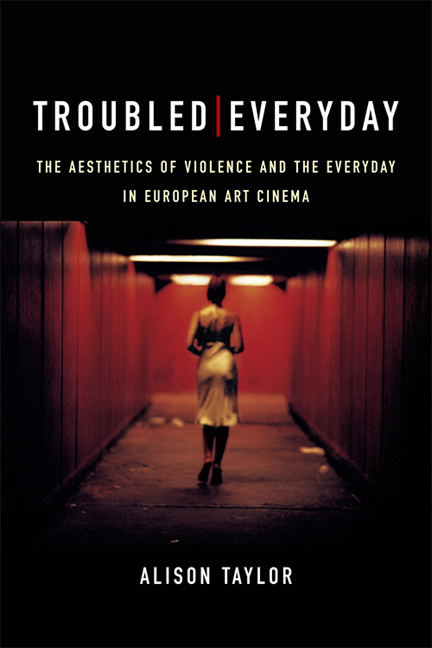1 - ‘A lightning that illuminates the banal’: Violence and the Everyday
Published online by Cambridge University Press: 22 December 2017
Summary
Things flash up – little worlds, bad impulses, events alive with some kind of charge. Sudden eruptions are fascinating beyond all reason, as if they're divining rods articulating something. But what? (Kathleen Stewart, Ordinary Affects, 68)
A mother and her two teenage daughters are resting at a roadside stop when a madman smashes through the windshield of their sedan to crush the eldest girl's skull with a hatchet. An insurance broker interrupts his otherwise banal evening to rape the small boy he holds captive in his basement, then marks the event in a day planner. A widowed housewife systematically carries out her domestic duties, including prostituting herself, before stabbing a client to death with a pair of scissors. A petit-bourgeois family sit down to a lavish meal only to then destroy all their belongings and commit suicide.
In each of these extreme moments it is the domestic, the familial and the routine that serves as their setting and currency. Brushing teeth, getting ready for and going to work, watching television, smoking cigarettes, shopping for groceries, doing the laundry – all those little cumulative non-events that populate day-to-day life, that in most films are effaced or at least dulled to a kind of background noise to furnish ‘real drama’, are here made prominent. It is not that these films are devoid of action, rather, when the dramatic does occur it ruptures the viewing experience with such unparalleled acerbity that it gives one cause to reflect on what was actually at stake in the commonplace.
This book is about the tension between violence and the everyday in European art cinema. It is about perceived excesses, seemingly meaningless acts of violence which when scrutinised are found to be inextricably connected to the everyday. And it is about the ways in which these films invite us to, and then thwart us from reconciling these two poles, preventing us closing down the emotions they elicit into a contained whole.
The films observed in the pages to follow employ violent disruptions to the everyday that throw into focus a troubling inability to understand the world and others. Far from being shock for shock's sake, I argue that these violent punctures speak to a fundamental human desire for meaning.
- Type
- Chapter
- Information
- Troubled EverydayThe Aesthetics of Violence and the Everyday in European Art Cinema, pp. 1 - 15Publisher: Edinburgh University PressPrint publication year: 2017



